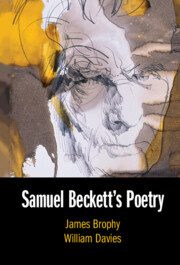Book contents
- Samuel Beckett’s Poetry
- Samuel Beckett’s Poetry
- Copyright page
- Contents
- Notes on Contributors
- Acknowledgements
- Abbreviations
- Introduction
- Chronology of Samuel Beckett’s Poetry
- Chapter 1 Weirdness and Dislocation in Beckett’s Early Poetry
- Chapter 2 Whole Fragments
- Chapter 3 Pre-echoing the Bones
- Chapter 4 ‘The Nucleus of a Living Poetic’
- Chapter 5 Beckett Growing Gnomic
- Chapter 6 Gender, Pronoun and Subject in ‘Poèmes 1937–1939’
- Chapter 7 The Missing Poème
- Chapter 8 Romanticism and Beckett’s Poetry
- 9 Romance under Strain in ‘Cascando’
- Chapter 10 Samuel Beckett’s Self-Translated Poems
- Chapter 11 Samuel Beckett’s Translations of Mexican Poetry
- Chapter 12 Beckett’s Poetry and the Radical Absence of the (War) Dead
- Chapter 13 Beckett’s Sound Sense
- Chapter 14 The Matter of Absence
- Chapter 15 ‘Mocked by a Tissue That May Not Serve’
- Chapter 16 Invoking Beckett
- Index
Chapter 1 - Weirdness and Dislocation in Beckett’s Early Poetry
Published online by Cambridge University Press: 15 December 2022
- Samuel Beckett’s Poetry
- Samuel Beckett’s Poetry
- Copyright page
- Contents
- Notes on Contributors
- Acknowledgements
- Abbreviations
- Introduction
- Chronology of Samuel Beckett’s Poetry
- Chapter 1 Weirdness and Dislocation in Beckett’s Early Poetry
- Chapter 2 Whole Fragments
- Chapter 3 Pre-echoing the Bones
- Chapter 4 ‘The Nucleus of a Living Poetic’
- Chapter 5 Beckett Growing Gnomic
- Chapter 6 Gender, Pronoun and Subject in ‘Poèmes 1937–1939’
- Chapter 7 The Missing Poème
- Chapter 8 Romanticism and Beckett’s Poetry
- 9 Romance under Strain in ‘Cascando’
- Chapter 10 Samuel Beckett’s Self-Translated Poems
- Chapter 11 Samuel Beckett’s Translations of Mexican Poetry
- Chapter 12 Beckett’s Poetry and the Radical Absence of the (War) Dead
- Chapter 13 Beckett’s Sound Sense
- Chapter 14 The Matter of Absence
- Chapter 15 ‘Mocked by a Tissue That May Not Serve’
- Chapter 16 Invoking Beckett
- Index
Summary
For those new to Samuel Beckett’s work, his entire oeuvre can seem intimidatingly different from traditional notions of great writing. His prose and dramas often employ esoteric vocabulary used by people who may be social outcasts, or they feature arcane references articulated by disembodied beings. Yet likely no element of his work is as disconcertingly strange as his poetry. It makes almost no concessions to rhyme or beauty, often refers obliquely to Beckett’s personal experiences and repeatedly seems to relish transgressing poetical conventions and expectations by focusing on ennui, nausea, confusion and aimless wandering. This has meant that critics have largely attempted to explain and clarify Beckett’s poetry insofar as it is possible to elucidate a detectable meaning behind his verse or to excavate biographical details. Yet it is the supposition of this essay that Beckett’s poetry is intended, as an aesthetic experience, to provoke and induce a sense of confusion, dislocation and strangeness. The essay seeks in no way to diminish the value of clarifying Beckett’s meaning where possible; it merely asserts that his poetry appears to have been written so as to produce a sense of discomfort and uncertainty that annotation indisputably alters, often by diminishing the very alienation and discomposure the poems enact and examine.
- Type
- Chapter
- Information
- Samuel Beckett's Poetry , pp. 23 - 38Publisher: Cambridge University PressPrint publication year: 2022



